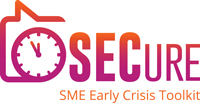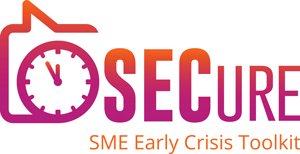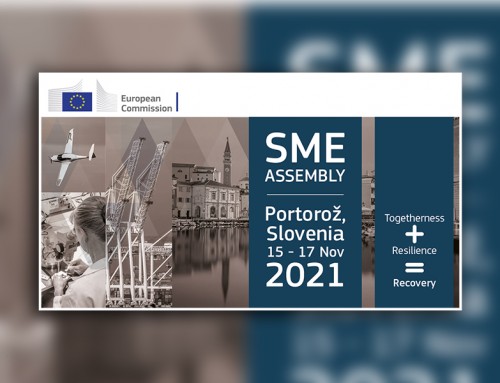Crisis Resilience And Winning In Business In Uncertain Times
Various studies assume that, depending on the country, between 7% and 25% of small and medium-sized enterprises are already in advanced stages of crisis, without having often realised this. The more advanced the stage of the crisis, the more complex and unlikely a successful restructuring becomes. While COVID-19 continues to loom across Europe, its medium-term impact is still unknown. What we do know is that the months/years ahead will be both volatile and dynamic for SMEs. Running a business can be a minefield at the best of times. Add a global pandemic into the mix and SMEs can really find themselves in trouble.
The creation of crisis resilience for SMEs and start-ups must be given greater attention in future. Our SECURE Erasmus+ team brought together a series of online focus groups, across four countries, Ireland, Germany, Greece and Spain to understand the challenges for SMEs facing crisis and to inform the development of our resources and tools. Few business failures result from a single cause. One cause may predominate, but failure usually results from inadequate response to several interrelated factors. It is clear that across Europe, different challenges arise. For example, for SMES in Greece and Spain, focus group members shared that politics causes continuous uncertainty.
“Every political crisis seems to lead to a decrease in investment and the cancellation of already arranged big projects, delays in payments, small business cannot survive the economic changes” (GRE).
“I consider especially important the economic and fiscal policy of the government, since it can have a positive or negative effect.” (SPA)
Small businesses generally have little ability to control external factors but must select appropriate strategies and actions to mitigate against the worst effect of a crisis episodes. Different economic crises such as banking, financial, and currency lead to high economic costs and have negative impact to whole society. There was consensus across all countries that Information is Power. Watch out for our soon to be published Country Reports to delve deeper into the findings of our research and focus groups.
In the meantime, through our work, we came across David Buslee who works to help companies develop and implement clear strategies, measure results and adapt to constant change. His article on Winning in Uncertain Times is insightful. He highlights five areas:-
1. Uncertainty – political and economic
Today’s business environment will create unexpected winners. What most companies don’t do is take advantage of this uncertainty to profit from the uncertain times.
2. Sales
In uncertain times, most companies cut back on sales and marketing costs to preserve cash flow. Winning companies focus their spending on key areas where their strengths provide them with defendable advantages. Winning companies know what products they should sell, and which ones have lower profitability. Winning companies know their market share and who their weaker competitors are.
3. Capital Assets
In uncertain times, most companies cut back on improving their equipment, sometimes even deferring maintenance so as to protect cash flow. Winning companies look at productivity. What affects the company’s ability to produce on time? What improvements can be made to use the experienced workforce more efficiently?
4. Cash Flow
In uncertain times, most companies don’t know how much cash they need or how their actions will affect their cash reserves. So they take on more debt, slow their spending and react to shortfalls in their cash. Winning companies know what their cash drivers are, their weekly, monthly and quarterly cash requirements, and the timing of their expenses. Winning companies deal with the cash on a proactive basis, never running out of cash or violating loan commitements.
5. Workforce
In uncertain times, most companies look to scale back their workforce. They look at length of service and intracompany relationships to determine who should be outplaced. Winning companies maintain honest and current performance evaluations for all employees and, through cross-training, continuous skill improvement and process documentation, retain key knowledge within the company and look to performance trends to assess staffing needs. Moreover, they maintain an assessment of needed skills so that when talent becomes available, they can add those skills to their workforce.





